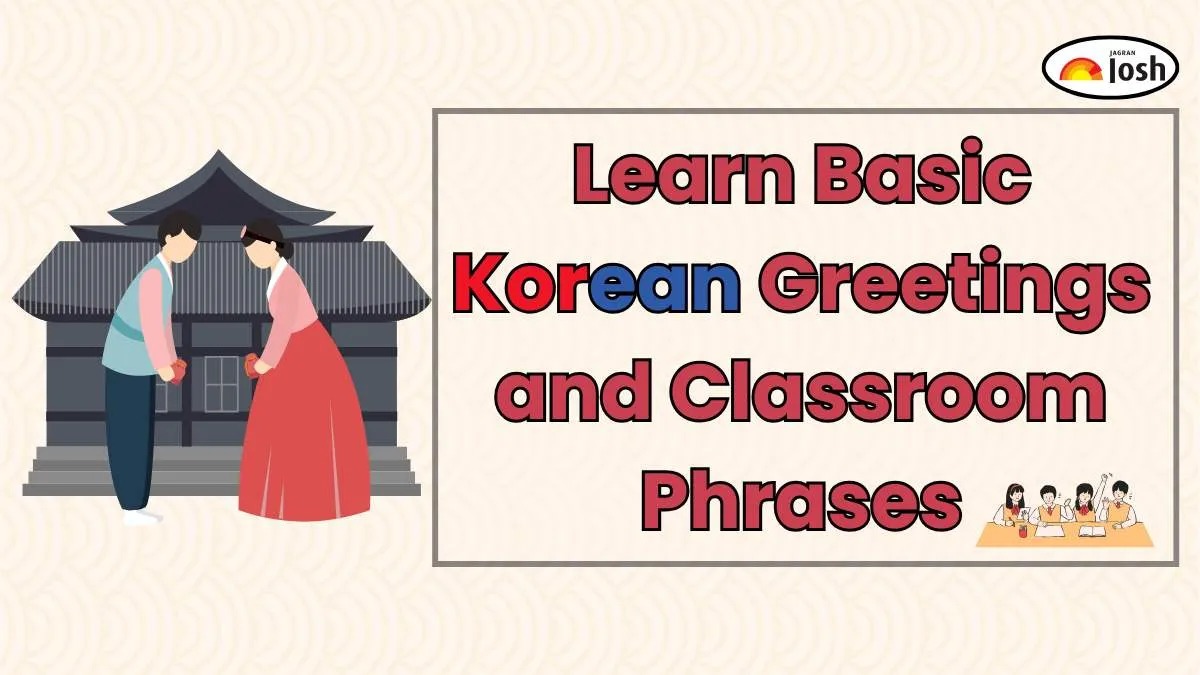For young people around the world, but especially in India, Korean culture has become immensely popular due to the captivating storylines of K-dramas and the catchy beats of K-Pop. More and more school children are mimicking their favorite Korean celebrities or singing Korean songs, creating a new channel for global communication: learning Korean!
But where should I begin this intriguing linguistic journey? Aspiring Korean speakers, don't be alarmed! Starting with the basic terms and greetings that are used in every school is the best course of action. By understanding these simple yet powerful terms, you may transform your interest into speaking with confidence. They are useful for interacting with Korean friends online, getting ready for a cultural exchange, and impressing your classmates with your newly acquired skills.
During a language class, imagine being able to say "Hello!" or "Thank you!" in Korean, or even "May I go to the restroom?" Connecting with a dynamic culture and learning a new style of expressing deference and civility are more important than simply using words. The worlds of "인사말" (Insamal, greetings) and "교실 표옄" (Gyosil Pyohyeon, classroom words) are interesting. Let's explore them!
Korean Greetings (인사말) with English Translation
Korean greetings are more than just words; they frequently convey formality and respect. It is always safe and appropriate to start with polite forms for schoolchildren. Here are some basic greetings to get you going:
| Korean Phrase (Hangul) | Romanization | English Translation | Usage Notes |
| 안녕하세요? | Annyeonghaseyo? | Hello? / How are you? | Most common and polite everyday greeting. Use with teachers, elders, or new acquaintances. |
| 안녕! | Annyeong! | Hi! / Bye! | Informal. Use with close friends your age. |
| 감사합니다. | Gamsahamnida. | Thank you. | Polite and common way to express gratitude. |
| 천만에요. | Cheonmaneyo. | You're welcome. | Polite response to "Thank you." |
| 죄송합니다. | Joesonghamnida. | I'm sorry. | Polite apology. Use for minor mistakes. |
| 미안합니다. | Mianhamnida. | I'm sorry. | Slightly less formal than Joesonghamnida, but still polite. |
| 잘 가요. | Jal gayo. | Goodbye (to someone leaving). | Used when you are staying and someone else is leaving. |
| 안녕히 계세요. | Annyeonghi gyeseyo. | Goodbye (to someone staying). | Used when you are leaving and someone else is staying. |
Cultural Tip: A slight bow often accompanies these greetings, especially Annyeonghaseyo and Gamsahamnida, as a sign of respect.
Classroom Phrases in Korean with English Translation:
Learning a new language often happens in a classroom setting, and knowing how to interact there in Korean can make your learning experience much smoother and more engaging. These phrases will help you understand your teacher and ask questions confidently.
Teacher's Instructions (and your understanding!):
| Korean Phrase (Hangul) | Romanization | English Translation | Context |
| 잘 들으세요. | Jal deureuseyo. | Please listen carefully. | Teacher's instruction. |
| 따라 하세요. | Ttara haseyo. | Please repeat after me. | Teacher asking students to repeat. |
| 읽으세요. | Ilgeuseyo. | Please read. | Teacher asking students to read something. |
| 쓰세요. | Sseuseyo. | Please write. | Teacher asking students to write. |
| 보세요. | Boseyo. | Please look. | Teacher drawing attention to something. |
| 앉으세요. | Anjeuseyo. | Please sit down. | Teacher asking students to sit. |
| 일어서세요. | Ireoseyo. | Please stand up. | Teacher asking students to stand. |
| 알겠습니다. | Algesseumnida. | I understand. / Got it. | Student's polite response to show understanding. |
| 모르겠습니다. | Moreugesseumnida. | I don't understand. | A student's polite way to say they don't understand. |
Student Questions & Requests:
| Korean Phrase (Hangul) | Romanization | English Translation | Usage Notes |
| 질문 있습니다. | Jilmun itseumnida. | I have a question. | Polite way to ask a question. |
| 다시 한번 말해주세요. | Dasi hanbeon malhaejuseyo. | Please say it one more time. | When you didn't catch something. |
| 화장실에 가도 돼요? | Hwajangsire gado dwaeyo? | May I go to the restroom? | Polite request to leave the classroom. |
| 물 마셔도 돼요? | Mul masyeodo dwaeyo? | May I drink water? | Polite request to drink water. |
Gaining knowledge of Korean offers doors to new cultures, friendships, and perspectives on the world. It's a thrilling adventure. Beginning with these fundamental greetings and classroom expressions, students in Noida and elsewhere can boldly venture into the intriguing world of Korean. Enjoy your educational journey and "癔이쌅!" (waiting! - You can do it!).
Also Check:
